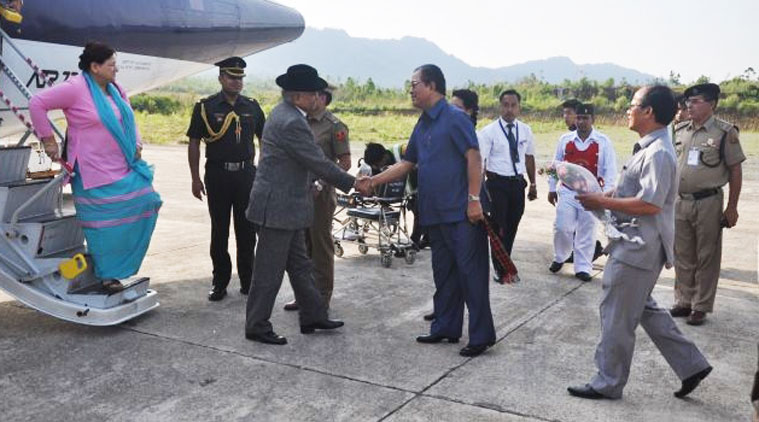Author Malsawmi Jacob was in high school when the independence
movement in the future state of Mizoram began in 1966. Her father, an
army subedar
stationed in the hill town of Shillong, now in the state of Meghalaya,
predicted at the time that ordinary people would bear the brunt of an
armed conflict. He was right.
The two-decade-long revolt by the Mizo National Front (MNF) would lead the Indian government to use war planes
against its own citizens for the first time. A “grouping” policy was
introduced where villages were burned and civilians herded to guarded
centres so that people would be unable to shelter insurgents.
The rebels signed a peace accord with the government in 1986, and
Mizoram came to be known as an “island of peace”, unlike neighbouring
northeastern states like Manipur, Nagaland and Assam where militant
violence continues. But Bangalore-based Jacob, whose new novel “
Zorami”
tells the story of a girl in the backdrop of the “disturbance”, said
for many people who suffered during the insurgency, the pain remains.

Sixty-two-year-old Jacob, perhaps the only Mizo author to have
published a novel in English, spoke about why she decided to write about
the “ram buai” (disturbance in the land), and why she thinks the
decision of the Mizo rebels to take up arms was a mistake.
Q: Why did you decide to write a novel with the insurgency as a backdrop?
A: We were staying in Guwahati in 2002, where I used to contribute
to regional news publications. Mizoram was often described as an “island
of peace”. I thought about the hardships we (Mizos) went through, and I
started wondering how the people from that period are coping
emotionally. I wanted to find out.
So in 2004, I travelled to places like Aizawl and Lunglei (towns in
Mizoram) and interviewed people who were somehow involved with the
insurgency. I asked them to describe their experiences during that
period. And it was worse than what I thought. The Mizo people’s hearts
have still not healed… I wanted to take a literary approach in
describing what I discovered. So I started attempting to turn it into a
novel.
Q: Who did you talk to during your research?
A: Those who experienced the disturbance. Some people are well known
like Pu James Dokhuma and Rev. LN Ralte. They were part of those who
started the peace process so they were well known. I also talked to my
own relatives, some of whom have spent time in jail. And some others I
met at random in places of gathering, like at a mourner’s house
(in Mizo society, whenever someone dies, relatives and people in the society gather for days to mourn) where I asked people to share their experiences. I also read a few books where people documented their experience.
Q: How much truth is there in the events that you described in the book?
A: The backbone is based on real incidents. I just embellished it with my imagination.
Q: You said people are still hurting?
A: Our suffering was so much. Atrocities committed were so much that
we still can’t forget it, and our heart still aches. There are a few,
the more hardcore ones, who are still talking about whether we should
renew the fight for independence.
Q: Did you personally experience the insurgency period?
A: I didn’t because we were outside the state. I was in high school
when the disturbance started. My father used to lament about it and
often said the people will suffer because of the uprising.
Q: Apart from some short story books and poems, I haven’t seen any
novel written by a Mizo author in English. What do you think is the
state of Mizo literature?
A: I think there still isn’t enough depth when it comes to Mizo
literature. We still have some way to go. It’s beginning to look good –
book releases have increased, and writers are also increasing, but we
need to improve the quality of work.
Q: Do you think the armed uprising was necessary?
A: My personal opinion is violence should not have been used at all.
We were unhappy with the Indian government, the Assam government
(present-day Mizoram was then a district of Assam),
and it was necessary to show it. But taking up arms was a big mistake
because we suffered so much. And for the people who lost their fathers
and mothers, who lost their children, no outcome really mattered. We
should have fought with peaceful means, according to me.
Q: Was the protagonist Zorami used as a metaphor for the Mizos –
their suffering and the influence of the church and spirituality in
their culture?
A: Yes, I used the name Zorami deliberately to describe the Mizo people. I also used her as a symbol.
(“Zoram” is a term of endearment used to describe Mizoram; “i” denotes the name is that of a female)
Like her, we suffered because of the disturbance, but we can be
healed through God – not symbolic worshipping at church etc but
achieving peace through an individual discovery of God. That’s what I
wanted to show, and what I believe in.















